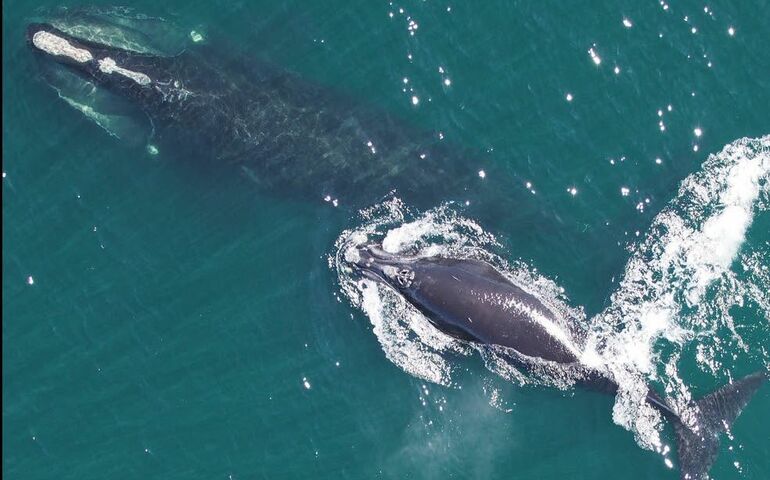
Court says federal right whale protection inadequate, but avoids shuttering lobster fishery
 Courtesy / Northeast Fisheries Science Center
Protection for the endangered North Atlantic right whale from Maine's lobster fishery continues to be controversial.
Courtesy / Northeast Fisheries Science Center
Protection for the endangered North Atlantic right whale from Maine's lobster fishery continues to be controversial.
In the latest legal skirmish between conservationists and the fishing industry, a judge last week ruled that the federal government has failed to adequately protect the endangered North Atlantic right whale from fixed lobster fishing gear.
But U.S. District Court Judge James Boasberg in Washington, D.C., said his finding didn’t immediately warrant shutting down the fishery.
“The court’s finding at this junction do not dictate that it must immediately shutter the American lobster fishery; indeed, it is cognizant of what a weighty blow that would inflict,” Boasberg wrote in his decision.
Instead, he ordered additional briefing on potential remedies.
The decision reaffirmed his earlier finding in a lawsuit brought by a group of environmental organizations against the National Oceanic and Atmospheric Administration, claiming the latter had violated the Endangered Species Act when it authorized the lobster fishery without appropriately analyzing its impact on right whales.
That lawsuit centered on the National Marine Fishery Service’s responsibilities under the Endangered Species Act and the Marine Mammal Protection Act to protect critically endangered North Atlantic right whales. The federal agency is also responsible for authorizing the lobster fishery, whose thick vertical fishing lines entangle and harm right whales.
Last week, Boasberg said the service might find “that other measures exist to reduce lethal take, or that projected take is in fact lower than originally estimated.”
In his preamble to the decision, Boasberg waxed lyrical.
“The lives of our vast oceans may appear timeless,” he wrote. “Indeed, at the end of Moby-Dick, ‘the great shroud of the sea rolled on as it rolled five thousand years ago. Not so, however, for many creatures who live there, including its greatest leviathans.'”
He noted that only around 370 North Atlantic right whales remain in existence.
“For centuries, these whales were imperiled by excessive hunting, but today the greatest human-caused threat comes from entanglement in fishing gear,” he said. “Much of that gear is dropped into the ocean by crews fishing for lobster.”
The Endangered Species Act requires the National Marine Fisheries Service to authorize the fishery only if its operations don’t jeopardize the right whale’s continued existence.
Lobster industry
In a subsequent statement, the Maine Lobstermen’s Association endorsed Boasberg’s statement regarding the possibility that the take of endangered whales might be lower than originally estimated.
The association has filed its own lawsuit against the service, which remains pending. That case “demonstrates that the government’s order for a 98% reduction in the lobster fishery’s minimal risk to right whales rests solely on hypothetical, inflated estimates unsupported by the agency’s own data,” the association said.

The association is reviewing the court’s opinion with its lawyers. "But we are heartened that the court recognizes the great importance of Maine’s lobstering heritage and appreciates the potential and unnecessary harm that could be imposed on the men and women who work so hard to make our industry thrive,” said the association’ executive director, Patrice McCarron.
Virginia Olsen, a spokesperson with the Maine Lobstering Union in Trenton, said the union is exploring legal options to ensure that actions by federal regulatory agencies result in meaningful protections for the whale but “do not needlessly jeopardize Maine’s heritage industry without any corresponding benefit to the right whale population."
Conservationists
But conservation organizations Center for Biological Diversity, Conservation Law Foundation and Defenders of Wildlife, which filed the lawsuit, hailed the decision as a victory.
“The court found that the agency had violated the Endangered Species Act and Marine Mammal Protection Act when it issued a May 2021 biological opinion and a September 2021 final rule because not enough was done to reduce the lobster fishery’s lethal threat to right whales,” the groups said in a joint statement.
The decision came after more than four and a half years of litigation.
Conservation groups originally sued in federal court in Washington, D.C., in early 2018. In April 2020 the groups won a ruling that the service’s prior biological opinion on the lobster fishery had violated the Endangered Species Act. Per a court order, the agency had until May 31, 2021, to finalize a new biological opinion.
The service issued a new rule on Aug. 31, 2021, to reduce lethal entanglements in the lobster fishery, while also saying that U.S. fisheries would nonetheless continue to entangle more than 15% of the right whale population each year, or roughly 55 right whales a year based on current population. The service estimated the entanglements would result in the death or serious injury of more than three right whales each year.
The groups amended its lawsuit in September 2021 to add claims alleging that the agency’s new rule violated the Marine Mammal Protection Act by failing to reduce the risk that right whales will die in lobster lines to the low levels required by the statute within six months of implementation.
The filing also argued that the agency’s assessment of how the lobster fishery affects right whales, called a biological opinion, failed to comply with the Endangered Species Act because it contained a statement that authorized “zero” lethal takes despite anticipating more than three such takes a year.
The court ordered the parties to submit a joint proposed briefing schedule on remedy by July 20 and scheduled a status hearing for July 22.
Last November, the Maine Lobstermen’s Association launched a three-year, $10 million fundraising campaign to fight what the group says are onerous federal regulations threatening the future of the industry.







0 Comments